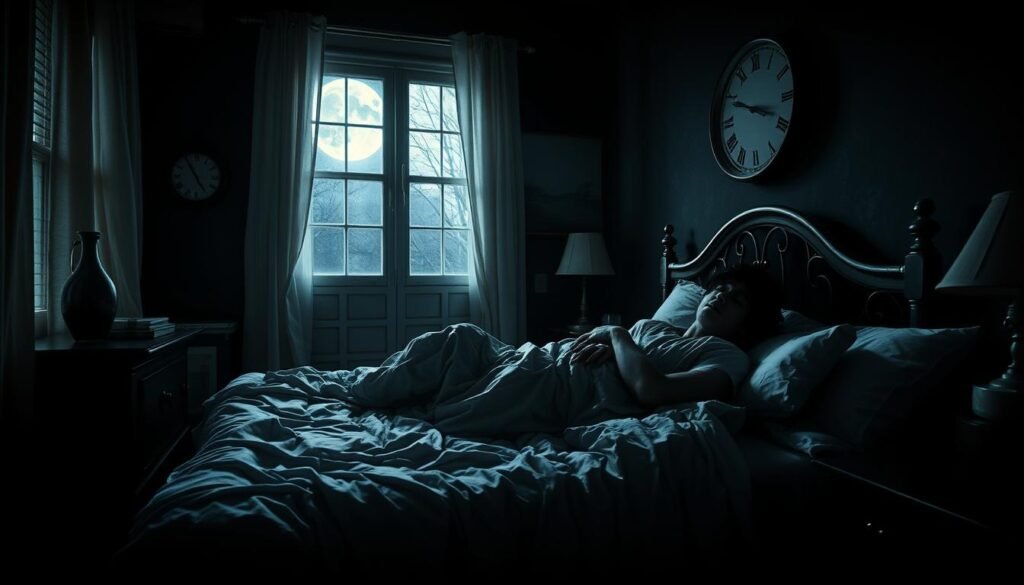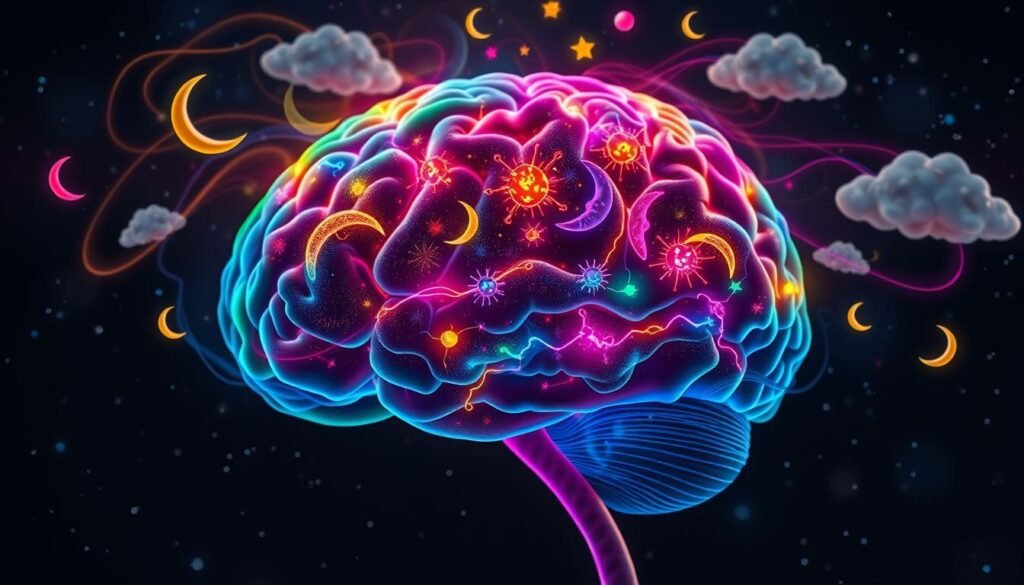Did you know a fact from the Centers for Disease Control and Prevention? It says nearly one-third of adults don’t get the 7-9 hours of sleep they need each night. This shows how common it is for people to have trouble sleeping because of anxiety. Anxiety can make it hard to sleep, creating a tough cycle. This cycle can lead to serious sleep issues and affect our health a lot.
Understanding how anxiety and sleep affect each other is very important. Stress can make it hard to sleep, turning into long-term sleeping problems. This impacts our energy and overall health. Also, about 33% of folks who can’t sleep well have an anxiety disorder. The good news is, there are good sleep strategies available. They can help you escape this bad cycle for more restful sleep and energetic days.
Key Takeaways
- Anxiety can really mess with how well you sleep, leading to insomnia.
- Keeping the same sleep routine can make your sleep much better.
- Using relaxation methods can lower anxiety and make sleep easier.
- Cognitive Behavioral Therapy for Insomnia (CBT-I) works well for sleep issues.
- If you still have trouble sleeping, asking a pro for help is a good idea.
- Exercising regularly and eating right can boost both your sleep and mental health.
Understanding the Connection Between Anxiety and Sleep
There’s a deep link between anxiety and sleep that affects our well-being. Many people with anxiety find it hard to slow down their thoughts at night. This makes sleeping tough. Studies show that 20% to 45% of those with panic disorder have night panic attacks, showing how anxiety impacts sleep. In the U.S., around 20% of adults deal with anxiety disorders, which often lead to sleeping problems.
Around 24% to 36% of individuals who struggle to sleep at night also suffer from an anxiety disorder. This link tells us fixing sleep issues may help handle anxiety. A 2016 study found that those with panic disorder are three times more likely to have sleep issues. Anxiety and insomnia often feed into each other, creating a hard-to-break cycle.
To counter anxiety’s effect on sleep, adopting good sleep habits is key. Creating a bedtime routine, exercising, and making a cozy sleeping area can improve sleep. Cognitive behavioral therapy (CBT) also helps better sleep for those with anxiety. This is based on studies that saw improved sleep in those who responded to the therapy.
Understanding the complex relationship between anxiety and sleep is essential. Further research and steps can lead to improved mental health. For more information on anxiety and sleep, you can check out this resource. Recognizing symptoms and seeking help early can greatly aid in managing anxiety and sleep problems.
| Anxiety Disorder | Prevalence in U.S. Adults (%) | Associated Sleep Issues |
|---|---|---|
| Generalized Anxiety Disorder | 3.1 | Sleep disturbances, insomnia |
| Panic Disorder | 2.7 | Nighttime panic attacks |
| Social Anxiety Disorder | 7.1 | Difficulty sleeping |
| Specific Phobias | 9.1 | Sleep anxiety |
| Obsessive-Compulsive Disorder | 1.2 | Insomnia, sleep interruptions |
| Post-traumatic Stress Disorder | 3.6 | Insomnia, nightmares |
What is Insomnia?
Insomnia is a sleep disorder where people have trouble sleeping. Around 30% of adults in the U.S. experience insomnia at some point. The term insomnia definition includes different types, like acute and chronic insomnia. Acute insomnia is short-term, often due to stress, and lasts under three months. Chronic insomnia lasts longer, happening three nights a week for more than three months.
Knowing the insomnia symptoms can help spot it. These symptoms include:
- Hard time falling asleep
- Often waking up at night
- Waking up too early and not being able to sleep again
- Feeling tired or sleepy during the day
- Struggling to focus or concentrate
Many things can cause insomnia. Stress, bad sleep habits, and mental health issues like anxiety can make it worse. Insomnia is more common as people get older and in women during hormonal changes. It also links to other health problems, increasing the risk for chronic diseases.
Understanding the types of insomnia is useful:
| Type of Insomnia | Duration | Triggers |
|---|---|---|
| Acute Insomnia | Less than 3 months | Stressful life events |
| Chronic Insomnia | 3 or more nights a week for 3 months or longer | Stress, habits, other health conditions |

To manage insomnia, recognizing symptoms and causes is vital. Mental healthcare and treatments such as cognitive behavioral therapy can help. This approach helps address sleep problems and boosts overall health.
The Science Behind Anxiety Keeping Me Awake
Anxiety impacts many people in the U.S. Studies show around 30% of adults deal with anxiety disorders at some point. Science of sleep looks into how anxiety and brain chemicals affect sleep patterns. This can lead to a cycle where anxiety makes it hard to sleep or worsens because of it. The brain sends more alert signals, making restful sleep hard to achieve.
Anxiety is linked to certain neurochemicals in our brain. For example, high levels of noradrenaline can wake you up at night feeling anxious. Our body’s survival instinct causes this, but it doesn’t help us rest well today. Poor sleep can also mess with our body’s stress response. This makes our mental and emotional state worse and keeps the cycle of anxiety and sleep problems going.
Stress during the day can lead to anxiety at night, especially if you usually have trouble sleeping. At night, without distractions, it’s easier for anxious thoughts to take over. But managing anxiety, like making to-do lists, can help a lot. A study showed people who wrote down their tasks slept faster than those who didn’t.
Relaxation techniques are key for handling anxiety-induced insomnia. If you’re struggling to sleep, try taking a 15-minute break in another room. Stay away from watching the clock or using screens. Using methods like these helps tackle anxiety symptoms and sleep issues. This is crucial for our overall health and happiness.

Recognizing the Cycle of Anxiety and Insomnia
The link between anxiety and insomnia forms a hard cycle to break. Many people can’t sleep because of anxiety, a big issue for those with insomnia from anxiety. When anxiety goes up, getting to sleep is tough. This makes for more anxiety, keeping the cycle going. It’s key to understand this anxiety insomnia cycle to find ways to cope.
How Sleep Disruption Leads to Increased Anxiety
Not sleeping well really impacts mental health. People with insomnia often feel very tired, easily annoyed, and find it hard to focus. This can make anxiety worse, making daily life tough. Not dealing with sleep problems can lead to weight gain, bad job performance, and problems with friends or family. Keeping a sleep diary can help you see patterns and manage better.
Common Types of Sleep Disorders Related to Anxiety
Anxiety can lead to many types of sleep disorders, which can really affect health. Some common ones include:
| Sleep Disorder | Description |
|---|---|
| Insomnia | Characterized by difficulties falling asleep or staying asleep due to stress or anxiety. |
| Sleep Apnea | A condition where breathing repeatedly stops and starts during sleep, often causing daytime fatigue. |
| Restless Legs Syndrome | An uncontrollable urge to move the legs, usually due to uncomfortable sensations, negatively impacting sleep. |
| Narcolepsy | Involves excessive daytime sleepiness and sudden sleep attacks, often related to anxiety. |
| Shift Work Sleep Disorder | Arises from conflicts between work schedules and natural sleep-wake cycles, leading to increased anxiety. |
| Delayed Sleep Phase Disorder | A condition where the natural sleep pattern is significantly delayed, causing difficulties adhering to standard sleep schedules. |

Knowing these sleep disorders helps people get the right help. Treatments like Cognitive Behavioral Therapy (CBT) work well for anxiety and insomnia. Also, natural remedies and relaxation methods can improve sleep.
Getting to understand the anxiety insomnia cycle is key for better sleep and mental health. Handling anxiety in different ways can make sleep better and life more rewarding.
Effective Stress Management Techniques for Better Sleep
Managing stress is key to getting good sleep, especially for those who are anxious. Many people can’t sleep because they can’t stop thinking. But, with right strategies, this problem can be reduced.
Utilizing Relaxation Techniques
Relaxation techniques can greatly help with stress and sleep. Techniques like slow breathing, muscle relaxation, and meditation are useful. A survey showed that 44% of people couldn’t sleep due to stress at times.
By doing activities like yoga or tai chi for 20 to 25 minutes daily, many felt better. They coped well and didn’t wake up as much at night.
Here are some specific relaxation methods to fight anxiety and insomnia:
- Deep Breathing: Gentle breathing helps reduce stress and brings calmness.
- Progressive Muscle Relaxation: It helps relieve physical tension for better relaxation.
- Mindfulness Meditation: This approach decreases sleep problems and anxiety.
- Yoga and Tai Chi: These activities improve emotional health and reduce stress.
Implementing Cognitive Behavioral Therapy
Cognitive behavioral therapy (CBT) is excellent for dealing with night-time anxiety. It changes negative thoughts that cause insomnia. CBT teaches how to sleep better and cope in a healthier way.
For those with ongoing stress, CBT is very helpful. It works by:
- Identifying what causes anxiety and lack of sleep.
- Changing thoughts and actions that affect sleep badly.
- Learning techniques to handle anxiety without drugs.
Importance of Sleep Hygiene
Good sleep hygiene is crucial for better sleep quality. It involves steps that make your sleep environment healthy and a steady sleep routine. These actions help you fall and stay asleep easier, more so now when stress is high.
Creating a Sleep-Inducing Environment
To have a restful sleep, your environment is key. Here are sleep hygiene tips:
- Use blackout curtains or sleep masks to keep your room dark.
- Keep the room temperature cool, ideally between 60-67°F (15-19°C).
- Use sound machines or earplugs to cut down on noise.
- Get rid of distractions like electronic devices that have blue light.
Establishing a Consistent Sleep Schedule
Having a regular sleep schedule really helps your body’s clock. It makes it easier to fall asleep and wake up. Try these methods:
- Sleep and wake up at the same times every day, including weekends.
- Do relaxing activities before bed, like reading or meditating.
- Avoid heavy meals, caffeine, and alcohol before sleeping.
Following these tips, you can improve your sleep setup and routine. This boosts your overall health and happiness.
Natural Remedies for Better Sleep
Are you looking to improve your sleep without medicine? Many natural remedies can help. Herbal supplements and mindfulness meditation have shown good results. Let’s explore herbal options and how mindfulness helps in getting better sleep.
Herbal Solutions and Supplements
Herbal supplements are gaining popularity as a natural way to enhance sleep. Some well-known options include:
- Melatonin: This hormone helps control your sleep-wake cycle. It is sold in doses from 3–10 mg. It’s especially helpful for people with irregular sleep schedules.
- Valerian Root: Taken about an hour before bed, valerian makes it faster to fall asleep. Though results vary, many find it effective.
- Chamomile: Drunk as tea, this herb aids relaxation. However, some may experience mild side effects.
- Passionflower: Good for easing anxiety, this herb also slightly improves sleep. It’s a natural way to sleep better.
- Lavender: Its calming scent can improve sleep, mainly in older people.
| Herbal Supplement | Benefits | Potential Side Effects |
|---|---|---|
| Melatonin | Boosts sleep quality, great for disturbed sleep schedules | May cause daytime sleepiness, headaches |
| Valerian Root | Encourages relaxation, cuts down on time to fall asleep | Can lead to dizziness, stomach problems |
| Chamomile | Promotes relaxation, may better sleep | Possible nausea, dizziness |
| Passionflower | Aids in anxiety reduction, enhances sleep perception | Might cause sleepiness, confusion |
| Lavender | Has a soothing effect, good for sleep | Rare; usually safe |
Mindfulness Meditation Practices
Mindfulness meditation is key to reducing anxiety and sleeping better. It trains your mind to stay in the moment. This reduces stress and betters sleep quality. Techniques like body scans and mindful breathing help prep for sleep.
Adding mindfulness to your routine helps tackle anxiety. It’s a peaceful way to support sleep using herbal remedies. Together, they offer a complete plan for restful sleep.
When to Seek Professional Help for Anxiety and Insomnia
About 30% of adults will face anxiety disorders in their lives. Many ways can help with anxiety and insomnia, but sometimes, you need professional help. Anxiety can mess up your sleep, making you feel tired and cranky. Knowing when to get professional help is key.
Understanding Treatment Options
If you’re dealing with insomnia because of anxiety, there are many ways to help. You might start feeling better one or two months after starting therapy or medication. Here are effective methods:
- Therapy: Cognitive Behavioral Therapy (CBT-I) targets insomnia tied to anxiety. It works on changing thought patterns and behaviors.
- Medications: Certain medicines can help, but it’s important to watch out for side effects that could make anxiety worse.
- Lifestyle Changes: Activities like regular exercise and breathing exercises can really help lessen anxiety and improve how well you sleep.
The Role of Therapy and Medications
Therapy and medicines are crucial in treating anxiety and insomnia. Therapy gives you ways to handle worry, and medicines help regulate sleep. Healthcare providers will create a plan just for you, which can include:
| Treatment Type | Description | Effectiveness |
|---|---|---|
| Cognitive Behavioral Therapy (CBT-I) | It’s a way of therapy aimed at treating insomnia due to anxiety. | It’s very successful in making symptoms better after just a few times. |
| Medications | They’re drugs prescribed to lower anxiety and make sleep better. | They work well for many people but need to be watched closely. |
| Mindfulness Practices | These are methods like relaxation exercises and meditation. | They’re great for dealing with stress and anxiety. |
| Regular Exercise | Working out helps decrease anxiety levels. | It’s proven to better sleep quality over time. |
Getting professional help can make your life much better, improving mental health and lessening anxiety symptoms as time goes on. Knowing when to seek help is crucial for anyone suffering from anxiety and insomnia.
Conclusion
The link between anxiety and insomnia is really strong. People dealing with anxiety often find sleeping hard, which makes their mental health worse. So, it’s super important to know how anxiety and sleep affect each other.
Understanding this can help people work towards better sleep. Things like managing stress well and good sleep habits are key.
There are many ways to fight insomnia linked to anxiety. Methods like relaxation techniques, natural remedies, and getting help from professionals can really help. These steps can improve your mental and physical health, leading to better sleep.
Plus, knowing signs of sleep anxiety helps people deal with stress early on. This can stop things from getting worse.
Taking a whole view of sleep and mental health helps a lot. It’s about making small positive changes and being happy with little wins. Understanding the role of mental health in sleep issues can lead to better sleep solutions.
This in-depth knowledge helps people get back to sleeping well. It also boosts their quality of life. For more info, do read about the impact of sleep on anxiety.